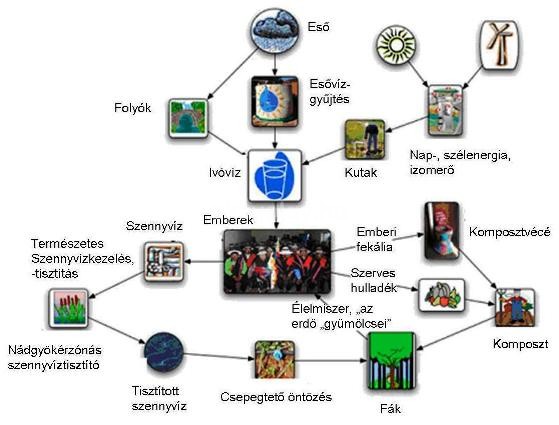 In our green household series, so far we have spoken on eco-friendly washing detergents and gels. One of the main reasons of using them is that they function in an eco-friendly way, that is to say to use these makes less damage to the environment than the use of their conventional equivalents. In the following articles of our series we will speak on the topic of water management, describing such areas like reed-bed sewage system, or the know-how of setting up a compost toilet, or the method of gathering rain water. We begin our series of articles with the topic of wastewater management.
In our green household series, so far we have spoken on eco-friendly washing detergents and gels. One of the main reasons of using them is that they function in an eco-friendly way, that is to say to use these makes less damage to the environment than the use of their conventional equivalents. In the following articles of our series we will speak on the topic of water management, describing such areas like reed-bed sewage system, or the know-how of setting up a compost toilet, or the method of gathering rain water. We begin our series of articles with the topic of wastewater management.
When speaking about water, we may state that this element of nature has a prominent role in the maintenance of life. Without fresh water we would not be able to exist, it is life’s prime want. Nonetheless, it is also important to deal with it because of its role in self-sufficiency. Our country has favourable conditions in this regard: the Carpathian basin collects the water from the surrounding areas, that is to say we live in a confluence territory with waters under and above surface. Here one can find under surface one of the greatest drinking water resources in Europe. Climate change has a negative impact even here influencing the quantity of resources, what to speak of the always relevant question of water quality, which naturally depends on the way we manage our wastewater.
There has to be a sustainable approach in relation to water management as well. Besides one has to see that it is quite a complex topic, which in addition to drinking water includes the area of environment-friendly and sustainable wastewater management as well. A self-sufficient community or individual is able to utilize the so-called secondary products, that is to say greywater (faeces and urine free waste water) or blackwater. The former is used for irrigation; the latter – after appropriate and careful treatment – can be used in composting.
You may see the way of sustainable water management in the following illustration.

What is the main problem in wastewater management?
In short and generally, it is the waste-thrift use of water, moreover, our carelessness, that is we do not think it over what is happening to wastewater after water goes down the sink or we flush the toilet.
The water system of today’s households and within that the comfortable wash-out water-closet are extremely waster and put a heavy burden on the environment because of the great amount of wastewater. In an average household blackwater arising from using the toilet is mixed with less polluted greywater that arises during activities like washing, washing-up, etc. The result of this is that one gets a greater amount of blackwater, the cleaning of which represents a major problem and needs more endeavour to do so.
So what is the solution? If there were not any blackwater, which could be managed by the use of composting toilets, and the arising greywater can be naturally treated, cleaned and utilized for instance for irrigation with the use of reed-bed sewage.
To be continued…
Beáta Hári
